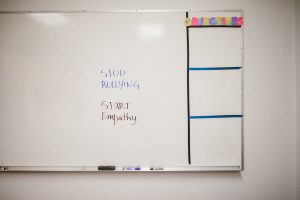
[Pexels, RODNAE Productions]
Bullying is a huge problem. It’s not just a problem that happens in schools; with the rising usage of social media, cyberbullying is becoming more prominent as well.
There are many guides online about what to do if you are being bullied.
But what many people don’t know is that the bond between parent and child can affect their risk of getting bullied, or whether they turn into a bully themselves.
What is Bullying?

[Pexels, Porapak Apichodilok]
Verbal bullying is saying and writing mean things, and can involve actions like taunting and name-calling.
Social bullying may be seen as similar to verbal bullying, since it’s when bullies hurt the victim’s reputation and/or relationships. This could be by spreading rumours, ostracising or other methods.
Physical bullying is when bullies hurt a victim physically or harm their possessions. They may do this by pushing or hitting the victim, and breaking the victim’s items.
Completely opposite to that is cyberbullying, which is bullying through online platforms. These platforms could be social media platforms like Instagram or Twitter.
Effects of Bullying

[Pexels, RODNAE Productions]
Children who were bullied are at higher risk for depression and anxiety. They may also feel more isolated and lonely.
In addition to that, they may not want to go to school and struggle with their grades. Some may even drop out of school.
Bullying victims are also more likely to engage in risky behaviour as they grow up, such as abusing alcohol or drugs, getting into fights and starting to have sex earlier than they should.
Bullied people are also at higher risk of becoming bullies themselves or abusive towards other people in their lives.
How Parental Bonds Affect the Risk of Bullying

[Pexels, Ketut Subiyanto]
If a child has a positive and healthy relationship with their parents, they will be more familiar with what healthy relationships should be like.
They will also have a higher self-esteem as they understand that they are worthy of love and respect.
That lessens the need to make themselves feel better about themselves through bullying and acquiring a higher social status.
Also, when parents respond to their child being bullied instead of letting it happen, they are telling the child that bullying is not accepted and that action needs to be taken.
A child who knows this and has a healthy self-esteem is more likely to stand up to bullies and try to stop the bullying.
When Do Children Go to Their Parents?

[Pexels, Pixabay]
A parent-child bond relationship is one of the first relationships a child will have in their life. In order for them to feel like they can confide in their parents, they need to trust their parents, right?
With trust and good, healthy relationships, children feel like they can go to their parents and confide in them more. They will be able to reach out to their parents when they are being bullied.
Then, their parents can step in and help them.
Healthy Parental Bonds

[Pexels, Ketut Subiyanto]
A healthy relationship with parents can be defined as parents who don’t put their child down and a child can go to their parents when in distress and know that they will be comforted.
A child should know that they can go to their parent for comfort if they need it. When they can’t, they start to develop an insecure parental attachment.
Essentially, the child should be able to go to their parent without fearing any consequences, even consequences like judgement.
Conclusion

[Pexels, Ketut Subiyanto]
While friends can be a huge source of support in the case of bullying, not all children have friends and parent-child ties should never be overlooked as a form of support.
Good parent-child relationships have a huge impact on a child’s emotional and social development, their self-esteem, education and more.
That’s why it’s important to cultivate such good ties between parent and child, in order to prevent or lessen the risk of bullying in the future.
